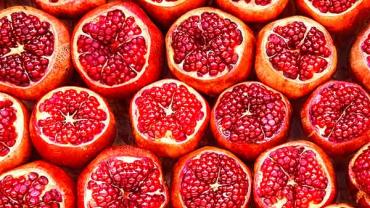
The humble pomegranate has experienced a resurgence in the past few years. Pomegranate juice is a regular staple in health food stores and conventional supermarkets alike, and you can even find gourmet chocolate bars studded with dried pomegranate arils. But there are ways to get the benefits of pomegranate without added sugar, and plenty of benefits there are, especially for cardiovascular health.
Pomegranates are rich in phytochemicals that may help support cardiovascular function. Assessment of 12 pomegranate varieties showed that total phenolic content ranged from 580.8 to 2551.3 mg/L of pomegranate juice. Breaking down the total phenolic content, anthocyanins accounted for 20 to 82%, phenolic acids and ellagitannins 16 to 65%, and flavonoids rounded things out at 2 to 23%. This high polyphenol content is believed to be responsible for the antioxidant effects of whole pomegranate fruit, juice and extracts.
Considering the overwhelming prevalence of metabolic syndrome and type 2 diabetes in North America, most fruit juices and other forms of liquid sugar should be off the menu. Pomegranate juice may be a sensible exception, though, particularly when consumed unsweetened. One paper’s authors even called it a “heart-healthy fruit juice.”
In subjects with hypertension, consumption of 50 ml of pomegranate juice daily led to a 36% decrease in serum ACE activity and a 5% reduction in systolic blood pressure. The authors noted that previous research had shown that even when there’s no decrease in blood pressure, a reduction in ACE activity still attenuates atherosclerosis, possibly by decreasing oxidative stress.
A study looking at the effects of pomegranate juice consumption on the progression of carotid lesions and changes in oxidative stress and blood pressure in atherosclerotic patients with carotid artery stenosis (n=10) found that after 1 year of juice consumption, carotid intima media thickness (CIMT) was reduced by up to 30%, compared to a 9% increase in the control group, which did not consume the juice. The juice group also had a 12% reduction in systolic blood pressure, a 19% decrease in serum levels of antibodies against oxidized LDL, and a 130% increase in serum total antioxidant status after 1 year. Five subjects continued to drink the pomegranate juice for an additional 2 years, but the only additional improvement was a 16% decrease in serum lipid peroxidation.
It may be a bit odd to do so, but there might be some benefit to consuming the whole pomegranate fruit, not just the juicy arils. A study looking at antioxidant activity, total polyphenol content, total anthocyanin content, and levels of four major hydrolyzable tannins in different juice and fruit homogenate preparations from different sections of the fruit found that homogenates prepared from the whole fruit had nearly 20-fold higher antioxidant activity than that of the aril juice. Anyone who’s ever gotten curious and eaten some of the white part of the pomegranate fruit has noticed it’s very bitter and certainly isn’t what pomegranates are known for. It is edible, though, and according to the study, its high tannin content may be the reason for the higher antioxidant power of the blends that contained whole fruit.
So there are beneficial compounds in the fruit and juice, but pomegranates are the gift that keeps giving, because even the seeds have something to offer. Pomegranate seed oil is rich in a unique fatty acid called punicic acid, a form of conjugated linolenic acid (18:3 n‐5; molecular formula C18H30O2). Punicic acid has anti-inflammatory, anti-diabetic and nephroprotective effects, and may be helpful for blood lipid management. A randomized, double-blind placebo-controlled trial evaluated the effects of pomegranate seed oil (PSO) in 51 hyperlipidemic subjects. The groups received 400mg PSO or placebo twice daily for 4 weeks. Compared to placebo, PSO supplementation led to significant reductions in serum triglycerides, the TG:HDL ratio, and the total cholesterol:HDL ratio. Blood glucose, LDL-C and body composition remained unchanged, but the TG:HDL ratio is considered a powerful indicator of cardiovascular status, so this improvement is noteworthy.
Considering the benefits of pomegranate fruit and juice on cardiovascular health, maybe it’s not a coincidence that the juice is bright red and the arils aren’t too far from heart-shaped.